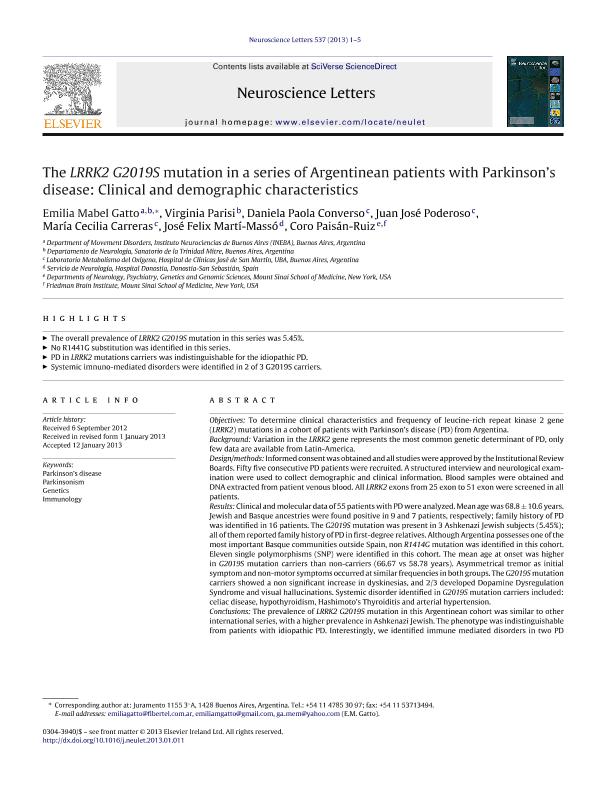Artículo
The LRRK2 G2019S mutation in a series of Argentinean patients with Parkinson's disease: Clinical and demographic characteristics
Gatto, Emilia Mabel; Parisi, Virginia; Converso, Daniela Paola ; Poderoso, Juan José
; Poderoso, Juan José ; Carreras, Maria Cecilia
; Carreras, Maria Cecilia ; Martí Massó, José Félix; Paisán Ruiz, Coro
; Martí Massó, José Félix; Paisán Ruiz, Coro
 ; Poderoso, Juan José
; Poderoso, Juan José ; Carreras, Maria Cecilia
; Carreras, Maria Cecilia ; Martí Massó, José Félix; Paisán Ruiz, Coro
; Martí Massó, José Félix; Paisán Ruiz, Coro
Fecha de publicación:
03/2013
Editorial:
Elsevier Ireland
Revista:
Neuroscience Letters
ISSN:
0304-3940
e-ISSN:
1872-7972
Idioma:
Inglés
Tipo de recurso:
Artículo publicado
Clasificación temática:
Resumen
OBJECTIVES: To determine clinical characteristics and frequency of leucine-rich repeat kinase 2 gene (LRRK2) mutations in a cohort of patients with Parkinson's disease (PD) from Argentina. BACKGROUND: Variation in the LRRK2 gene represents the most common genetic determinant of PD, only few data are available from Latin-America. DESIGN/METHODS: Informed consent was obtained and all studies were approved by the Institutional Review Boards. Fifty five consecutive PD patients were recruited. A structured interview and neurological examination were used to collect demographic and clinical information. Blood samples were obtained and DNA extracted from patient venous blood. All LRRK2 exons from 25 exon to 51 exon were screened in all patients. RESULTS: Clinical and molecular data of 55 patients with PD were analyzed. Mean age was 68.8±10.6 years. Jewish and Basque ancestries were found positive in 9 and 7 patients, respectively; family history of PD was identified in 16 patients. The G2019S mutation was present in 3 Ashkenazi Jewish subjects (5.45%); all of them reported family history of PD in first-degree relatives. Although Argentina possesses one of the most important Basque communities outside Spain, non R1414G mutation was identified in this cohort. Eleven single polymorphisms (SNP) were identified in this cohort. The mean age at onset was higher in G2019S mutation carriers than non-carriers (66.67 vs 58.78 years). Asymmetrical tremor as initial symptom and non-motor symptoms occurred at similar frequencies in both groups. The G2019S mutation carriers showed a non significant increase in dyskinesias, and 2/3 developed Dopamine Dysregulation Syndrome and visual hallucinations. Systemic disorder identified in G2019S mutation carriers included: celiac disease, hypothyroidism, Hashimoto's Thyroiditis and arterial hypertension. CONCLUSIONS: The prevalence of LRRK2 G2019S mutation in this Argentinean cohort was similar to other international series, with a higher prevalence in Ashkenazi Jewish. The phenotype was indistinguishable from patients with idiopathic PD. Interestingly, we identified immune mediated disorders in two PD patients carrying the G2019S mutation. Within this context, recent studies have identified full-length LRRK2 as a relatively common constituent of many cell types in the immune system including human peripheral blood mononuclear cells. Nevertheless, a casual association could not be excluded and the analysis of more extensive series is required.
Palabras clave:
Parkinson'S Disease
,
Parkinsonism
,
Genetics
,
Immunology
Archivos asociados
Licencia
Identificadores
Colecciones
Articulos(INIGEM)
Articulos de INSTITUTO DE INMUNOLOGIA, GENETICA Y METABOLISMO
Articulos de INSTITUTO DE INMUNOLOGIA, GENETICA Y METABOLISMO
Citación
Gatto, Emilia Mabel; Parisi, Virginia; Converso, Daniela Paola; Poderoso, Juan José; Carreras, Maria Cecilia; et al.; The LRRK2 G2019S mutation in a series of Argentinean patients with Parkinson's disease: Clinical and demographic characteristics; Elsevier Ireland; Neuroscience Letters; 537; 3-2013; 1-5
Compartir
Altmétricas



